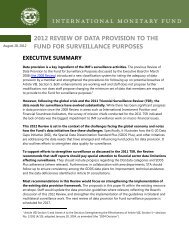ECB Annual Report on supervisory activities
ssmar2016.en.pdf?utm_source=POLITICO.EU&utm_campaign=b1bb431652-EMAIL_CAMPAIGN_2017_03_23&utm_medium=email&utm_term=0_10959edeb5-b1bb431652-189797857&utm_source=POLITICO
ssmar2016.en.pdf?utm_source=POLITICO.EU&utm_campaign=b1bb431652-EMAIL_CAMPAIGN_2017_03_23&utm_medium=email&utm_term=0_10959edeb5-b1bb431652-189797857&utm_source=POLITICO
Create successful ePaper yourself
Turn your PDF publications into a flip-book with our unique Google optimized e-Paper software.
Finally, the <strong>on</strong>going cooperati<strong>on</strong> between the <str<strong>on</strong>g>ECB</str<strong>on</strong>g> and the NCAs is supported by<br />
c<strong>on</strong>tinuous efforts to further align the processes and methodologies for supervising<br />
the LSI sector. The NCAs’ <strong>supervisory</strong> <strong>activities</strong> and tasks in respect of LSIs and the<br />
analysis and identificati<strong>on</strong> of risks and vulnerabilities in the LSI sector are regularly<br />
summarised, inter alia, in the form of dedicated reports, which are shared with<br />
supervisors across the euro area. Cooperati<strong>on</strong> and interacti<strong>on</strong> also relies heavily <strong>on</strong><br />
sharing and exchanging data. Towards that end, the <str<strong>on</strong>g>ECB</str<strong>on</strong>g> and the NCAs are<br />
developing mechanisms to enhance the exchange of informati<strong>on</strong>.<br />
Box 1<br />
Instituti<strong>on</strong>al protecti<strong>on</strong> schemes<br />
Significant advance in work <strong>on</strong> instituti<strong>on</strong>al protecti<strong>on</strong> schemes that began in 2015 17<br />
In some Member States, savings banks and cooperative banks have established instituti<strong>on</strong>al<br />
protecti<strong>on</strong> schemes (IPSs). These IPSs protect their member instituti<strong>on</strong>s and, in particular, ensure<br />
their liquidity and solvency. Overall, 50% of the euro area’s total number of credit instituti<strong>on</strong>s are<br />
members of an IPS, representing around 10% of the banking sector’s total assets. Work that had<br />
started in 2015 <strong>on</strong> the development of a comm<strong>on</strong> approach towards assessing IPSs, with a view to<br />
establishing a c<strong>on</strong>sistent <strong>supervisory</strong> treatment of IPSs across the euro area, was completed in<br />
2016.<br />
Guide <strong>on</strong> the approach for the recogniti<strong>on</strong> of IPSs for prudential purposes<br />
A guide <strong>on</strong> the approach for the recogniti<strong>on</strong> of IPSs for prudential purposes was developed in the<br />
c<strong>on</strong>text of the <str<strong>on</strong>g>ECB</str<strong>on</strong>g>’s work <strong>on</strong> opti<strong>on</strong>s and discreti<strong>on</strong>s available in EU law. Following a public<br />
c<strong>on</strong>sultati<strong>on</strong>, the guide was finalised and published in July 2016. The guide seeks to ensure<br />
coherence, effectiveness and transparency regarding the <strong>supervisory</strong> policy that will be applied<br />
when assessing IPSs. This is of particular importance as the official recogniti<strong>on</strong> of an IPS leads to a<br />
different treatment of some of the prudential requirements under the Capital Requirements<br />
Regulati<strong>on</strong> (CRR), namely a 0% risk weight for exposures to other IPS members and the removal of<br />
limits <strong>on</strong> large exposures to other IPS members.<br />
Coordinati<strong>on</strong> and cooperati<strong>on</strong> for “mixed” IPSs regarding decisi<strong>on</strong>-making and <strong>on</strong>going<br />
m<strong>on</strong>itoring<br />
IPSs typically c<strong>on</strong>sist of both significant instituti<strong>on</strong>s and less significant instituti<strong>on</strong>s (“mixed” IPSs). It<br />
is therefore particularly important that both the <str<strong>on</strong>g>ECB</str<strong>on</strong>g> and the NCAs treat IPSs in the same way. For<br />
this purpose an <str<strong>on</strong>g>ECB</str<strong>on</strong>g> guideline addressed to the SSM competent authorities (comprising the <str<strong>on</strong>g>ECB</str<strong>on</strong>g><br />
and NCAs) was adopted and published in November 2016. It sets out the principles for coordinati<strong>on</strong><br />
between the <str<strong>on</strong>g>ECB</str<strong>on</strong>g> and the NCAs <strong>on</strong> IPS-related <strong>supervisory</strong> decisi<strong>on</strong>s and for the <strong>on</strong>going<br />
m<strong>on</strong>itoring of IPSs. It ensures that NCAs apply the same criteria when they assess IPS applicati<strong>on</strong>s<br />
from less significant instituti<strong>on</strong>s. In additi<strong>on</strong>, m<strong>on</strong>itoring groups made up of <str<strong>on</strong>g>ECB</str<strong>on</strong>g> and NCA staff were<br />
established in 2016 and have started their m<strong>on</strong>itoring <strong>activities</strong>. The <str<strong>on</strong>g>ECB</str<strong>on</strong>g>’s guideline does not affect<br />
IPS approvals that had been previously granted. However, a reassessment may be c<strong>on</strong>sidered in<br />
17<br />
The work c<strong>on</strong>ducted in this respect was described in the <str<strong>on</strong>g>ECB</str<strong>on</strong>g> <str<strong>on</strong>g>Annual</str<strong>on</strong>g> <str<strong>on</strong>g>Report</str<strong>on</strong>g> <strong>on</strong> <strong>supervisory</strong> <strong>activities</strong><br />
2015 page 43.<br />
<str<strong>on</strong>g>ECB</str<strong>on</strong>g> <str<strong>on</strong>g>Annual</str<strong>on</strong>g> <str<strong>on</strong>g>Report</str<strong>on</strong>g> <strong>on</strong> <strong>supervisory</strong> <strong>activities</strong> 2016 − Supervisory c<strong>on</strong>tributi<strong>on</strong> to financial<br />
stability 30



